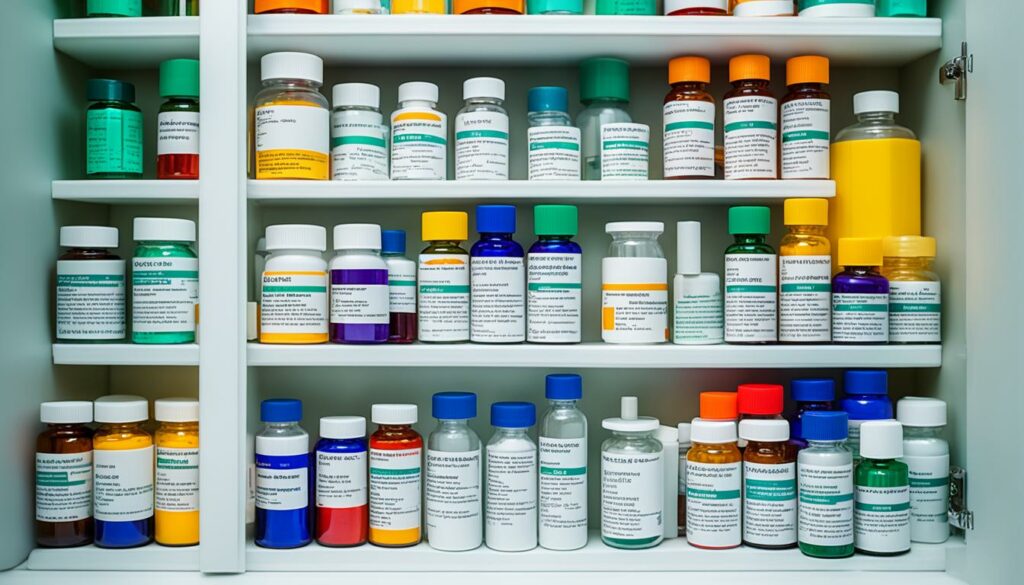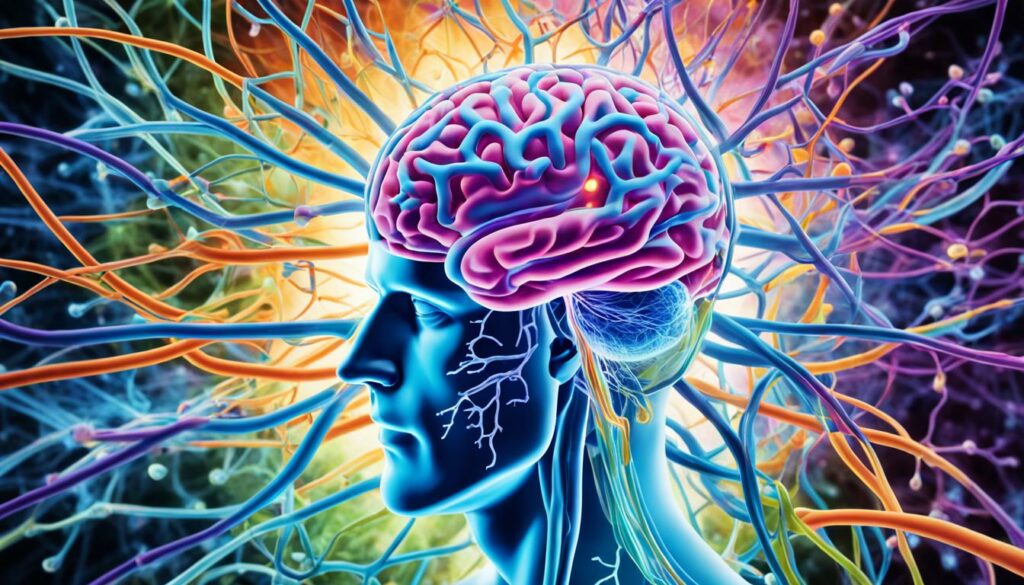Did you know that 6.1 million children in the United States have been diagnosed with attention-deficit/hyperactivity disorder (ADHD)? That’s approximately 9.4% of children between the ages of 2 and 17.
ADHD can significantly impact a person’s daily life, making it challenging to concentrate, control impulses, and stay organized. Fortunately, there are medications available that can help manage ADHD symptoms and improve overall functioning.
Key Takeaways:
- ADHD medication is an effective tool for managing symptoms and improving focus and impulse control.
- The FDA has approved various medications for treating ADHD, including stimulants and non-stimulants.
- Finding the right medication and dosage may require trial and error, as each individual may respond differently.
- It is important to work closely with a healthcare provider and monitor for any side effects or interactions.
- ADHD medication is not a cure, but it can greatly improve symptoms and daily functioning.
What is ADHD Medication?
ADHD medication is a valuable tool in helping individuals with Attention-Deficit/Hyperactivity Disorder (ADHD) manage their symptoms. While it does not cure ADHD, medication can provide relief and improve daily functioning by enhancing focus, reducing hyperactivity, and controlling impulsive behavior. The U.S. Food and Drug Administration (FDA) has approved several medications for the treatment of ADHD, offering options for children as young as 6 years old.
ADHD is a neurodevelopmental disorder characterized by core symptoms such as hyperactivity, impulsivity, and difficulty paying attention. These symptoms can persist into adulthood in around 90% of cases, leading to challenges in multiple areas of life. Adults with ADHD may struggle with following directions, remembering information, concentrating, and organizing tasks effectively.
ADHD medication works by increasing the levels of neurotransmitters in the brain, improving attention span, reducing hyperactivity, controlling impulsive behavior, and managing executive dysfunction.
ADHD medication aims to address these symptoms by targeting the underlying neurochemical imbalances in the brain. By increasing the levels of specific neurotransmitters such as dopamine and norepinephrine, ADHD medication can improve attention span, reduce hyperactivity, control impulsive behavior, and assist in managing executive dysfunction.
It is vital to note that while medication can be highly effective in alleviating symptoms, it is not a standalone solution. Comprehensive treatment for ADHD often involves a multimodal approach, combining medication with therapy, behavior changes, and skills training to optimize outcomes and improve quality of life.
Types of ADHD Medications
ADHD medications come in various forms, including stimulants, non-stimulants, and antidepressants. Each type has its own unique way of addressing ADHD symptoms and managing the condition. Let’s take a closer look at the different types of ADHD medications:
Stimulants for ADHD
Stimulant medications are the most commonly prescribed treatment option for ADHD. They work by increasing the levels of dopamine and norepinephrine in the brain, which can help improve attention and reduce hyperactivity. Stimulants are classified into two categories:
- Immediate-Release Stimulants: These medications, such as Ritalin and Dexedrine, take effect quickly but have a shorter duration of action, typically lasting up to four hours.
- Extended-Release Stimulants: Examples of extended-release stimulant medications include Adderall and Concerta. They provide a longer duration of action, lasting up to 16 hours, allowing for consistent symptom control throughout the day.
Stimulant medications should be taken under the guidance of a healthcare provider, who will determine the appropriate dosage and monitor for any potential side effects.
Non-Stimulants for ADHD
Non-stimulant medications are an alternative option for individuals who may not tolerate or respond well to stimulant medications. These medications primarily work by increasing the levels of norepinephrine in the brain, helping to improve attention and reduce ADHD symptoms. It is worth noting that non-stimulant medications may take longer to start working compared to stimulants.
Antidepressants for ADHD
Although not FDA-approved specifically for ADHD treatment, certain antidepressant medications can be prescribed off-label to help manage ADHD symptoms, especially when co-existing mood disorders are present. Antidepressants such as selective norepinephrine reuptake inhibitors (SNRIs) and alpha-2 adrenergic agonists may be considered as part of the treatment plan, depending on individual circumstances and healthcare provider recommendations.
It is crucial to work closely with a healthcare provider to determine the most suitable medication and dosage for each individual. Finding the right medication and dose may involve some trial and error, as different medications can have varying effects on different individuals.
Common ADHD Medication Names
There are several commonly prescribed ADHD medications available, approved by the FDA and categorized into different types. Here are some widely known ADHD medications:
Stimulant ADHD Medications
- Adderall: A combination of amphetamine salts, Adderall helps increase dopamine and norepinephrine levels in the brain, improving focus and reducing hyperactivity.
- Dexedrine: Another amphetamine-based medication, Dexedrine works similarly to Adderall, enhancing neurotransmitter levels.
- Ritalin: Also known as methylphenidate, Ritalin increases dopamine and norepinephrine activity, improving attention and reducing impulsivity.
- Focalin: A modified form of methylphenidate, Focalin provides similar benefits to Ritalin, helping individuals with ADHD concentrate and manage their symptoms.
Non-Stimulant ADHD Medications
- Atomoxetine (Strattera): A selective norepinephrine reuptake inhibitor (SNRI), Atomoxetine increases norepinephrine levels in the brain, helping improve attention and control hyperactivity.
- Clonidine (Kapvay): Primarily used to treat high blood pressure, Clonidine is also approved for the treatment of ADHD, particularly as an adjunct therapy to stimulant medications.
- Guanfacine (Intuniv): Like Clonidine, Guanfacine is an alpha-2 adrenergic agonist that can be prescribed for ADHD treatment, both as a monotherapy or in combination with other medications.
- Viloxazine (Qelbree): Recently approved by the FDA, Viloxazine modulates norepinephrine levels in the brain, offering an alternative non-stimulant option for ADHD management.
Antidepressant ADHD Medications
While not specifically FDA-approved for ADHD treatment, certain antidepressant medications may be prescribed off-label to manage ADHD symptoms, especially when co-existing mood disorders are present. Some antidepressants that may be used for ADHD include:
- Selective Norepinephrine Reuptake Inhibitors (SNRIs): Atomoxetine and Viloxazine, mentioned earlier as non-stimulant options, fall under this category as they affect norepinephrine reuptake.
- Alpha-2 Adrenergic Agonists: Guanfacine and Clonidine, previously mentioned non-stimulant medications, fall into this category as well, working by stimulating alpha-2 receptors.
It is important to consult with a healthcare provider to determine the most suitable medication based on individual needs. Healthcare professionals can provide guidance on the appropriate medication selection, taking into account factors such as medical history, potential side effects, and potential drug interactions. Finding the right medication and dosage may require some trial and error, as each person may respond differently to various medications.

For a visual representation of common ADHD medications, refer to the table below:
| Medication Type | Examples |
|---|---|
| Stimulant Medications | Adderall, Dexedrine, Ritalin, Focalin |
| Non-Stimulant Medications | Atomoxetine (Strattera), Clonidine (Kapvay), Guanfacine (Intuniv), Viloxazine (Qelbree) |
| Antidepressant Medications | Atomoxetine, Viloxazine, Guanfacine, Clonidine |
How ADHD Medication Works
ADHD medication plays a crucial role in improving neurotransmission in the brain, allowing neurons to effectively communicate with each other. Individuals with ADHD often experience disruptions in neurotransmission, leading to difficulties in attention and impulse control.
ADHD medications work by enhancing neurotransmission through two main mechanisms – increasing the release of neurotransmitters or slowing down their reuptake. Neurotransmitters like dopamine and norepinephrine are crucial for attention, focus, and impulse control. By increasing their levels, ADHD medication can significantly improve these cognitive functions.
For example, stimulant medications such as Adderall and Ritalin increase the release of dopamine and norepinephrine in the brain. This increased availability of neurotransmitters improves attention span, reduces hyperactivity, and helps individuals process and learn information more effectively.
“ADHD medication enhances neurotransmission, improving attention, reducing hyperactivity, and facilitating learning.”
It is important to note that ADHD medication is not a cure for the disorder. Instead, it works to reduce symptoms while it is active in the body. Additionally, different individuals may respond differently to various types of ADHD medication, necessitating a trial and error process to find the most effective medication and dosage.
Overall, ADHD medication’s ability to improve neurotransmission offers significant benefits for individuals with ADHD, allowing them to better manage their symptoms and engage more effectively in daily activities.

ADHD Medication and Neurotransmission
In individuals with ADHD, neurotransmission disruptions can lead to difficulties in attention and impulse control.
ADHD medication enhances neurotransmission by:
- Increasing the release of neurotransmitters like dopamine and norepinephrine
- Slowing down the reuptake of neurotransmitters
By increasing neurotransmitter levels in the brain, ADHD medication improves attention, reduces hyperactivity, and facilitates learning.
Considerations for Starting ADHD Medication
Before starting ADHD medication, it is essential to consider various factors. While medication can be a cornerstone of ADHD treatment, it is important to understand that it is not the only option available. Taking a multimodal approach to ADHD management can provide the best outcomes in many cases.
Behavior therapy is one alternative option that can be used in conjunction with medication. This therapy focuses on teaching individuals strategies and techniques to modify their behaviors and improve their coping skills. It can help individuals with ADHD develop practical strategies for organizing tasks, managing time, and controlling impulsive behavior.
When contemplating ADHD medication, it is crucial to weigh the potential benefits against the possible side effects and risks. It is essential to have an open and honest discussion with a healthcare provider to assess readiness for medication and determine the most suitable treatment plan.
An important consideration is finding the right medication, dose, and schedule for the individual. Not all medications work the same way for everyone, and it may take some time to find the most effective combination. Working closely with a healthcare provider is essential in monitoring medication effectiveness and adjusting the treatment plan as needed.
A multimodal treatment approach that combines medication, therapy, behavior changes, and skills training is often the most effective way to manage ADHD. This approach considers the individual’s unique needs and preferences, providing a comprehensive treatment plan that targets multiple aspects of ADHD symptoms and challenges.
By exploring alternative options to medication and considering the right treatment plan, individuals with ADHD can find a path to effectively manage their symptoms and improve their quality of life.

| Considerations for Starting ADHD Medication | Alternative Options to Medication |
|---|---|
| Assess readiness for medication | Behavior therapy |
| Weigh the benefits and risks | Skill-building and coping strategies |
| Work closely with a healthcare provider | Developing organizational skills |
| Find the right medication, dose, and schedule | Implementing time management techniques |
| Consider a multimodal treatment approach | Addressing impulsive behavior |
Conclusion
Managing ADHD symptoms effectively is crucial for individuals with ADHD. While medication can play a significant role in symptom management, it is important to understand that medication is not a cure for ADHD.
ADHD medication helps individuals with ADHD by improving focus, controlling impulses, and enhancing attention. There are different types of medications available, including stimulants, non-stimulants, and antidepressants. It is important to note that finding the right medication and dose may require some adjustments and trials, as each person may respond differently.
Consulting with a healthcare provider is essential to determine the most suitable medication based on individual needs. It is also important to monitor for any potential side effects or interactions with other medications. In addition to medication, a multimodal treatment approach that includes therapy, behavior changes, and skills training can provide the best outcomes for managing ADHD symptoms.
